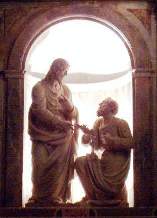 Non mi sembra che dall’ultimo Concilio Ecu-menico sia derivata alcuna ‘affermazione meraviglio-sa della Chiesa’, anzi, Essa ha perduto credito davanti agli stessi avversari, laici e d’altre religioni, nonostan-te essi applaudano al rivolgimento ecclesiastico, aperto allo spirito del mondo.
Non mi sembra che dall’ultimo Concilio Ecu-menico sia derivata alcuna ‘affermazione meraviglio-sa della Chiesa’, anzi, Essa ha perduto credito davanti agli stessi avversari, laici e d’altre religioni, nonostan-te essi applaudano al rivolgimento ecclesiastico, aperto allo spirito del mondo.
Della ‘vigorosa fioritura di virtù cristiane’ nemmeno l’ombra! Se c’è stato qualche caso privato e isolato, non è davvero per merito del Concilio!
I ‘fratelli e figli separati dalla Sede Apostolica’ non sono stati affatto ‘invitati e spronati a farvi ritorno’, perché il Concilio ha fatto scoprire non essere necessario il loro ritorno alla Chiesa Cattolica, dato che possono salvarsi anche restando nelle loro eresie che, naturalmente, non sono più considerate tali, ma modi diversi di esprimere la stessa verità. E dire che papa Giovanni XXIII ancora pensava alla loro conversione! Egli non immaginava che il suo Concilio avrebbe eliminato anche questa speranza, questa carità verso chi giace nell’errore e nel pericolo di perdersi.
 Simile trattamento di favore, come se la verità fosse qualcosa di com-merciabile, fu riservato pure ai non cristiani, agli ebrei, ai musulmani, ai pagani: ognuno può restare pacificamente nella sua credenza religiosa, purchè sia fedele osservante delle norme e delle direttive dettate dagli uomini. E’ abolito, perciò, ogni genere di proselitismo e si ha cura soltanto materiale degli infedeli.
Simile trattamento di favore, come se la verità fosse qualcosa di com-merciabile, fu riservato pure ai non cristiani, agli ebrei, ai musulmani, ai pagani: ognuno può restare pacificamente nella sua credenza religiosa, purchè sia fedele osservante delle norme e delle direttive dettate dagli uomini. E’ abolito, perciò, ogni genere di proselitismo e si ha cura soltanto materiale degli infedeli.
La Chiesa non è stata ‘illuminata dalla luce di questo Concilio’ (ma quale luce?) – Essa non si è ‘ingrandita di spirituali ricchezze’, anzi, ha perso quelle che aveva – non vi ha ‘attinto forza di nuove energie’, perché ha ceduto di fronte alle pressioni dei suoi nemici modernisti, laicisti, liberali, massoni, comunisti. Essa non può, pertanto, ‘guardare intrepida al futuro’ che non promette niente di buono – vediamo, piuttosto, sprofondare la sua gloria in un baratro, da cui pare impossibile che riesca a risollevarsi per le vie normali del ravvedimento di chi ha provocato tanta rovina.
 ‘Gli uomini, le famiglie, i popoli non volgono l’animo alle cose celesti’, infatti, si può constatare un abbandono progressivo della fede e delle pratiche religiose, una totale trascuratezza dell’istruzio-ne catechistica, una diminuzione spaventosa delle vocazioni, maschili e femminili (*), causate dal grande disinteresse verso i valori spirituali, dall’indifferentismo religioso nonché dalla perdita dei principi morali, del senso del peccato e, inutile dirlo, del timore di Dio.
‘Gli uomini, le famiglie, i popoli non volgono l’animo alle cose celesti’, infatti, si può constatare un abbandono progressivo della fede e delle pratiche religiose, una totale trascuratezza dell’istruzio-ne catechistica, una diminuzione spaventosa delle vocazioni, maschili e femminili (*), causate dal grande disinteresse verso i valori spirituali, dall’indifferentismo religioso nonché dalla perdita dei principi morali, del senso del peccato e, inutile dirlo, del timore di Dio.
No, i Cattolici di oggi non volgono davvero l’animo alle cose celesti, ma solo a quelle materiali e, se si interessano di religione (religione che non è più religione), è solo per i fini terreni della pace, della prosperità economica, del benessere economico, della concordia e della filantropica convivenza di tutti gli uomini.
 Al Concilio non è seguita la sperata, anzi, la profetata ‘Primavera della Chiesa’, bensì un rigidissimo inverno che ha congelato molti cuori, portandoli ad una vera apostasia, o, perlomeno (per ora), ad un cristianesimo insipido ed abbondantemente annacquato. Questi sono i frutti del Concilio, dai quali si può riconoscere quanto infausta sia stata l’idea di convocarlo: se essi non sono tutti originati dal Concilio, il Concilio, tuttavia, non vi ha rimediato, come si sperava.
Al Concilio non è seguita la sperata, anzi, la profetata ‘Primavera della Chiesa’, bensì un rigidissimo inverno che ha congelato molti cuori, portandoli ad una vera apostasia, o, perlomeno (per ora), ad un cristianesimo insipido ed abbondantemente annacquato. Questi sono i frutti del Concilio, dai quali si può riconoscere quanto infausta sia stata l’idea di convocarlo: se essi non sono tutti originati dal Concilio, il Concilio, tuttavia, non vi ha rimediato, come si sperava.
Questi frutti non erano imprevisti: ci furono, infatti, alcuni che misero in guardia dai pericoli cui si andava incontro, ma furono definiti, per disprezzo, ‘Profeti di sventura’. Dopo più di quarant’anni di generale, rovinoso decadimento, si vede chi avesse ragione: se i ‘Profeti di sventura’ oppure i ‘Profeti di buona ventura’.
Dopo il 1960, anno in cui avrebbe dovuto iniziare, con l’adempimento dei suggerimenti contenuti nel Terzo Segreto di Fatima, l’autentica primavera della Chiesa, non avendosi voluto ascoltare le parole della Madonna, hanno invece avuto inizio il calvario della Chiesa e tutti i mali che ci sono nel mondo, il peggiore dei quali è la lenta (non poi tanto lenta) perdita della fede dei cattolici, foriera di mali ancora più gravi.
 Non ci sono dubbi: la crisi della Chiesa è cominciata dal Concilio Vaticano II e dalle esagerate e sconsiderate innovazioni che ne sono conseguite. Da parte del Clero, in generale, specialmente giovane, e dei cattolici superficiali e licenziosi, è stato trovato un cristianesimo facile, piacevole, tollerante e permissivo, a cui non si vorrà in alcun modo rinunciare.
Non ci sono dubbi: la crisi della Chiesa è cominciata dal Concilio Vaticano II e dalle esagerate e sconsiderate innovazioni che ne sono conseguite. Da parte del Clero, in generale, specialmente giovane, e dei cattolici superficiali e licenziosi, è stato trovato un cristianesimo facile, piacevole, tollerante e permissivo, a cui non si vorrà in alcun modo rinunciare.
Grazie allo Spirito Santo, in seno alla Chiesa c’è ancora un piccolo gregge, fermo nella fede di sempre, irremovibile nelle sue convinzioni spirituali, risoluto ad andare avanti per la sua strada, che è la strada giusta, agguerrito contro tutti gli attacchi nemici, che non si lascia menare per il naso né sorprendere e trascinare in errore con l’inganno, soprattutto fiducioso in Dio e non negli uomini: è l’esercito fedelissimo alla Santa Tradizione, al Magistero infallibile della Chiesa, forte, come una rocca inespugnabile. E’ proprio questa rocca che i nemici vogliono espugnare ed abbattere – essi sanno bene che, fino a che questa rocca rimarrà inespugnata, il Cattolicesimo non sparirà dalla terra e continuerà ad essere una spina al loro fianco.
(*) (un aumento strepitoso si nota solo nei numeri delle vocazioni nei Seminari Tradizionali)












































Recent Comments